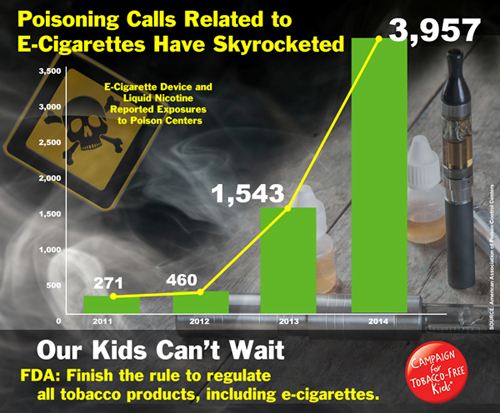News and Events
Warning Labels and Child-Resistant Packaging on Liquid Nicotine Bottles
August 20, 2015
There have been a number of media stories recently concerning the regulation of packaging for liquid nicotine intended for use in electronic cigarettes. The rapid increase of e-cigarette use by teens and the number of calls to poison centers involving e-cigarette liquids containing nicotine is an alarming public health concern. The state of Florida urges immediate guidance from federal regulators and calls for increased vigilance from parents, businesses and e-cigarette users to keep these items away from children.

Child-resistant packaging on bottles and cartridges of liquid nicotine used in e-cigarettes and other nicotine delivery devices are necessary to protect infants and children. If swallowed or absorbed through the skin, liquid nicotine can lead to serious illness or even death. In fact, the number of calls to poison centers involving e-cigarette liquids containing nicotine rose from one per month in September 2010 to 215 per month in February 2014, according to a study published last year by the Centers for Disease Control and Prevention (CDC). More than half of the calls to poison centers due to e-cigarettes involved young children under age 5.[i] The number of calls per month involving conventional cigarettes did not show a similar increase during the same time period.
In addition, warning labels on e-cigarettes and other nicotine delivery devices, which are currently unregulated, would be an important step in educating the public about the dangers of nicotine addiction, the fundamental reason individuals persist in using tobacco products.[ii] It is unclear if e-cigarettes and other nicotine delivery devices, like vapors and hookah pens, are a gateway to nicotine addiction and the use of other tobacco products among youth. What we do know is that in just one year, the number of high school students in the United States who used e-cigarettes tripled.[iii] We also know adolescents’ bodies are more sensitive to nicotine, and adolescents are more easily addicted than adults.[iv] Preventing nicotine addiction among teens is key to ending the tobacco epidemic, which remains the leading cause of preventable disease and death in this country.[v]
For these reasons, I urge the FDA to implement measures that restrict the availability and access of liquid nicotine to those under 18, including containers of liquid nicotine and devices used to deliver liquid nicotine such as e-cigarettes.
###
[i] U.S. Centers for Disease Control and Prevention (CDC). Notes from the Field: Calls to Poison Centers for Exposures to Electronic Cigarettes — United States, September 2010–February 2014. MMWR 2014; 3(13);292-293. <http://www.cdc.gov/mmwr/preview/mmwrhtml/mm6313a4.htm> [accessed 2014 Apr 24].
[ii] U.S. Department of Health and Human Services. How Tobacco Smoke Causes Disease: The Biology and Behavioral Basis for Smoking-Attributable Disease: A Report of the Surgeon General. Atlanta, GA: U.S. Department of Health and Human Services, Centers for Disease Control and Prevention, National Center for Chronic Disease Prevention and Health Promotion, Office on Smoking and Health, 2010.
[iii] Centers for Disease Control and Prevention (CDC). Tobacco Use Among Middle and High School Students — United States, 2011–2014. MMWR Morbidity and Mortality Weekly Report 64(14);381-385. 16 April 2015. <http://www.cdc.gov/mmwr/preview/mmwrhtml/mm6414a3.htm>
[iv] U.S. Department of Health and Human Services. How Tobacco Smoke Causes Disease: The Biology and Behavioral Basis for Smoking-Attributable Disease: A Report of the Surgeon General. Atlanta, GA: U.S. Department of Health and Human Services, Centers for Disease Control and Prevention, National Center for Chronic Disease Prevention and Health Promotion, Office on Smoking and Health, 2010.
[v] U.S. Department of Health and Human Services. The Health Consequences of Smoking—50 Years of Progress: A Report of the Surgeon General. Atlanta: U.S. Department of Health and Human Services, Centers for Disease Control and Prevention, National Center for Chronic Disease Prevention and Health Promotion, Office on Smoking and Health, 2014


